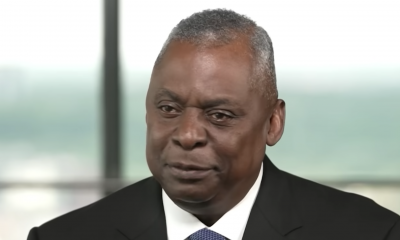National
Tension mounts as Senate prepares ‘Don’t Ask’ debate
Reid intends to file cloture petition for Tuesday vote

Senate Majority Leader Harry Reid (D-Nev.) has announced plans to proceed with major defense budget legislation containing “Don’t Ask, Don’t Tell” repeal language as questions linger about whether sufficient votes are present to move forward.
Reid officially announced plans to proceed with the fiscal year 2011 defense authorization bill and “Don’t Ask, Don’t Tell” on Tuesday during his press conference in the U.S. Capitol.
The majority leader said the defense authorization bill is “especially important” this year because the legislation will be a vehicle to address issues that he called “long overdue,” including “Don’t Ask, Don’t Tell.”
“I think we should choose common sense over discrimination,” Reid said. “We’re going to match our policy with our principles and finally say that in our country, everyone who steps up to serve our country should be welcome.”
Still, Reid acknowledged opposition in moving forward with the legislation and said he thinks he would have to file cloture to proceed with the bill.
“I would hope we can move to it without having to file cloture on a motion to proceed, but the way things have been going, having had to file cloture on filibuster to more than 100 different pieces of legislation, I probably will have to file cloture on that,” Reid said.
Jim Manley, a Reid spokesperson, told the Blade the senator intends to file cloture on the defense authorization bill this week for a vote on Tuesday.
Reid would file cloture after a senator objects to moving forward with the defense authorization bill with unanimous consent. After 30 hours of discussion, votes will be cast to determine whether 60 senators approve of ending the filibuster and officially moving to debate and amendments.
Asked at the conference whether he has 60 votes to proceed with the legislation, Reid replied, “We’ll sure find out.”
Aubrey Sarvis, executive director of Servicemembers Legal Defense Network, said he’s “reasonably confident” that “60 firm votes” are in the Senate to end a filibuster.
“I think we’ll actually probably end up with a couple more if needed,” Sarvis said. “I don’t think there are 40 senators who want to go on record as [being] opposed to calling up the defense authorization bill.”
Still, key Republicans in the Senate have expressed concern about the defense authorization bill and the “Don’t Ask, Don’t Tell” repeal language as well as other provisions in the legislation.
Senate Minority Leader Mitch McConnell (R-Ky.) called the repeal language a “controversial item” in response to an Blade inquiry on “Don’t Ask, Don’t Tell” during his press conference.
“The provision in the bill involves eliminating ‘Don’t Ask, Don’t Tell’ without the study, and that has also made it pretty controversial,” McConnell said.
The language in the defense authorization bill provides for repeal only after the Pentagon working group developing a plan for implemention an end to law finishes its work on Dec. 1.
An objction to proceeding would most likely come from Sen. John McCain (R-Ariz.), who has been the most vocal opponent of “Don’t Ask, Don’t Tell” repeal in the Senate. He has previoiusly objected to unanimous consent on bringing the defense authorization bill to the Senate floor.
Brooke Buchanan, a McCain spokesperson, said in a statement the senator “strongly believes” that Pentagon review should be complete before taking legislative action on “Don’t Ask, Don’t Tell.”
“As all four service chiefs have stated, we should not short circuit the ongoing Pentagon review and thereby deny our men and women in uniform a chance to have their voices heard on an important issue that affects them and their service,” she said.
Buchanan was referring to a letter from the four service chiefs made public this spring expressing their discontent with moving forward with “Don’t Ask, Don’t Tell” repeal before the Pentagon review is complete.
But Sarvis called the notion that Congress must wait for the Pentagon working group to finish its work a “tired talking point from the ‘no’ crowd.”
“Ironically, Congress, in all likelihood, will have that report before the vote is taken on the conference report in the lame duck session,” Sarvis said.
Reid said opponents of “Don’t Ask, Don’t Tell” repeal can have a vote when the legislation comes to the Senate floor on whether to strip out the language from the bill.
“They want a vote on it; they can have a vote on it,” Reid said.
Sarvis said repeal proponents have been anticipating this amendment to come to the Senate floor and are prepared to beat back such a measure.
“I think if Sen. McCain or another senator moves to strike the repeal provisions, we will prevail by a comfortable margin,” Sarvis said.
But finishing the bill before the lawmakers before lawmaker break before Election Day is seen as a major concern by repeal proponents.
Sarvis identified “time” as his biggest concern heading into Senate debate on “Don’t Ask, Don’t Tell” while emphasizing the importance of a Senate vote on the defense authorization bill in September before lawmakers adjourn for the break.
“As long as there are strong opponents in the Senate, they will try to tie this up and ensure that we don’t finish in September or early October,” Sarvis said. “We can’t allow that to happen.”
Sarvis said the lame duck session after Election Day is limited and bills that haven’t already made it through both chambers of Congress are less likely to meet approval.
DREAM Act comes into play
Also during the conference, Reid said he wants to amend the defense authorization bill so that it would include the Development, Relief and Education for Alien Minors Act, or DREAM Act, an immigration-related bill.
The legislation would provide a path to citizenship for young, undocumented immigrants pursuing a college education or position in the U.S. armed forces.
“Kids who grew up as Americans should be able to get their green card if they go to college or serve in the military,” Reid said.
The majority leader noted a number of U.S. service members are Hispanic and said “it’s really important that we move forward on this legislation that we tried to work on.”
Reid said moving forward on the DREAM Act as part of the defense authorization bill is partially in response what he called his inability to pass comprehensive immigration reform legislation this Congress.
“I know we can’t do comprehensive immigration reform,” Reid said. “I’ve tried so very, very hard. I’ve tried different iterations of this, but those Republicans we had in the last Congress have left us.”
McConnell cited the inclusion of the DREAM Act as a potentially “extraneous” amendment to the defense authorization bill.
The minority leader also was critical of Reid said he wants to address the issue of “secret holds” on presidential nominees as part of the defense authorization bill.
“It’s made it needlessly controversial,” McConnell said. “I can’t tell you right now how easy it will be to go forward with that bill, but it’s certainly created an element of controversy that would not have been otherwise there.”
Steve Ralls, a spokesperson for Immigration Equality, an LGBT immigration group, said his organzation was not part of discussion of including the DREAM Act as part of the defense authorization bill, but supports its passage.
“I can’t predict what the impact is going to be, but we certainly support the DREAM Act and I would say that we believe that the Senate majority leader is the right person to make the decision on how best to move forward,” Ralls said.
Sarvis said he doesn’t know whether this measure would complicate efforts for “Don’t Ask, Don’t Tell” repeal.
“I don’t think it has to,” Sarvis said. “I think they are two separate issues and, at the end of the day, I think each one of these amendments are going to have to stand or fall on their own.”
State Department
HIV/AIDS activists protest at State Department, demand full PEPFAR funding restoration
Black coffins placed in front of Harry S. Truman Building

Dozens of HIV/AIDS activists on Thursday gathered in front of the State Department and demanded the Trump-Vance administration fully restore President’s Emergency Plan for AIDS Relief funding.
Housing Works CEO Charles King, Health GAP Executive Director Asia Russell, Human Rights Campaign Senior Public Policy Advocate Matthew Rose, and others placed 206 black Styrofoam coffins in front of the State Department before the protest began.
King said more than an estimated 100,000 people with HIV/AIDS will die this year if PEPFAR funding is not fully restored.
“If we continue to not provide the PEPFAR funding to people living in low-income countries who are living with HIV or at risk, we are going to see millions and millions of deaths as well as millions of new infections,” added King.
Then-President George W. Bush in 2003 signed legislation that created PEPFAR.
The Trump-Vance administration in January froze nearly all U.S. foreign aid spending for at least 90 days. Secretary of State Marco Rubio later issued a waiver that allows the President’s Emergency Plan for AIDS relief and other “life-saving humanitarian assistance” programs to continue to operate during the freeze.
The Washington Blade has previously reported PEPFAR-funded programs in Kenya and other African countries have been forced to suspend services and even shut down because of a lack of U.S. funding. Two South African organizations — OUT LGBT Well-being and Access Chapter 2 — that received PEPFAR funding through the U.S. Agency for International Development and the Centers for Disease Control and Prevention in recent weeks closed down HIV-prevention programs and other services to men who have sex with men.
Rubio last month said 83 percent of USAID contracts have been cancelled. He noted the State Department will administer those that remain in place “more effectively.”
“PEPFAR represents the best of us, the dignity of our country, of our people, of our shared humanity,” said Rose.
Russell described Rubio as “ignorant and incompetent” and said “he should be fired.”
“What secretary of state in 90 days could dismantle what the brilliance of AIDS activism created side-by-side with George W. Bush? What kind of fool could do that? I’ll tell you who, the boss who sits in the Harry S. Truman Building, Marco Rubio,” said Russell.

U.S. Military/Pentagon
Pentagon urged to reverse Naval Academy book ban
Hundreds of titles discussing race, gender, and sexuality pulled from library shelves

Lambda Legal and the Legal Defense Fund issued a letter on Tuesday urging U.S. Defense Secretary Pete Hegseth to reverse course on a policy that led to the removal of 381 books from the Nimitz Library of the U.S. Naval Academy in Annapolis, Md.
Pursuant to President Donald Trump’s executive order 14190, “Ending Radical Indoctrination in K-12 Schooling,” the institution screened 900 titles to identify works promoting “diversity, equity, and inclusion,” removing those that concerned or touched upon “topics pertaining to the experiences of people of color, especially Black people, and/or LGBTQ people,” according to a press release from the civil rights organizations.
These included “I Know Why the Caged Bird Sings” by Maya Angelou, “Stone Fruit” by Lee Lai, “The Hate U Give” by Angie Thomas, “Lies My Teacher Told Me: Everything Your American History Textbook Got Wrong” by James W. Loewen, “Gender Queer: A Memoir” by Maia Kobabe, and “Democracy in Black: How Race Still Enslaves the American Soul” by Eddie S. Glaude, Jr.
The groups further noted that “the collection retained other books with messages and themes that privilege certain races and religions over others, including ‘The Clansman: A Historical Romance of the Ku Klux Klan’ by Thomas Dixon, Jr., ‘Mein Kampf’ by Adolf Hitler, and ‘Heart of Darkness’ by Joseph Conrad.
In their letter, Lambda Legal and LDF argued the books must be returned to circulation to preserve the “constitutional rights” of cadets at the institution, warning of the “danger” that comes with “censoring materials based on viewpoints disfavored by the current administration.”
“Such censorship is especially dangerous in an educational setting, where critical inquiry, intellectual diversity, and exposure to a wide array of perspectives are necessary to educate future citizen-leaders,” Lambda Legal Chief Legal Officer Jennifer C. Pizer and LDF Director of Strategic Initiatives Jin Hee Lee said in the press release.
Federal Government
White House sues Maine for refusing to comply with trans athlete ban
Lawsuit follows months-long conflict over school sports in state

The Justice Department is suing the state of Maine for refusing to comply with President Donald Trump’s executive order banning transgender athletes from participating in school sports, U.S. Attorney General Pam Bondi announced on Wednesday.
DOJ’s lawsuit accuses the state of violating Title IX rules barring sex discrimination, arguing that girls and women are disadvantaged in sports and deprived of opportunities like scholarships when they must compete against natal males, an interpretation of the statute that reverses course from how the law was enforced under the Biden-Harris administration.
“We tried to get Maine to comply” before filing the complaint, Bondi said during a news conference. She added the department is asking the court to “have the titles return to the young women who rightfully won these sports” and may also retroactively pull federal funding to the state for refusing to comply with the ban in the past.
Earlier this year, the attorney general sent letters to Maine, California, and Minnesota warning the blue states that the department “does not tolerate state officials who ignore federal law.”
According to the Maine Principals’ Association, only two trans high school-aged girls are competing statewide this year. Conclusions from research on the athletic performance of trans athletes vis-a-vis their cisgender counterparts have been mixed.
Trump critics and LGBTQ advocates maintain that efforts to enforce the ban can facilitate invasive gender policing to settle questions about an individual athlete’s birth sex, which puts all girls and women at risk. Others believe determinations about eligibility should be made not by the federal government but by school districts, states, and athletics associations.
Bondi’s announcement marked the latest escalation of a months-long feud between Trump and Maine, which began in February when the state’s Democratic governor, Janet Mills, declined to say she would enforce the ban.
Also on Wednesday, U.S. Education Secretary Linda McMahon said the findings from her department’s Title IX investigation into Maine schools — which, likewise, concerned their inclusion of trans student-athletes in competitive sports — was referred to DOJ.
Earlier this month, the Justice Department pulled $1.5 million in grants for Maine’s Department of Corrections because a trans woman was placed in a women’s correctional facility in violation of a different anti-trans executive order, while the U.S. Department of Agriculture paused the disbursement of funds supporting education programs in the state over its failure to comply with Title IX rules.
A federal court last week ordered USDA to unfreeze the money in a ruling that prohibits the agency from “terminating, freezing, or otherwise interfering with the state’s access to federal funds based on alleged Title IX violations without following the process required by federal statute.”
-

 District of Columbia5 days ago
District of Columbia5 days agoFinal push to raise funds, fill D.C. hotels as WorldPride nears
-

 El Salvador3 days ago
El Salvador3 days agoGay Venezuelan makeup artist remains in El Salvador mega prison
-

 District of Columbia4 days ago
District of Columbia4 days agoReenactment of 1965 gay rights protest at White House set for April 17
-

 Maryland5 days ago
Maryland5 days agoFreeState Justice: Transgender activist ‘hijacked’ Moore’s Transgender Day of Visibility event












